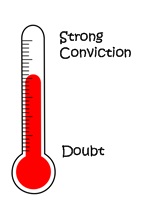Self-Efficacy
Self-efficacy is the extent of your belief in your own ability to succeed at a particular task or reach a certain goal at a specific point in time. It is your personal judgment about being able to perform a particular task or produce a certain result. Basically, it is your “I can do this” or “I cannot do this” belief.
Self-efficacy deals with your belief in future actions, performance, or abilities. Having high self-efficacy generally means that you have a strong belief in your ability and/or aptitude that the desired outcome can be achieved. Simply put, it is firmly believing you can do specific task. For example, if you are practicing free throws in basketball and are able to make 95% of them, your self-efficacy will be high when ask to make a free throw in the future. Conversely, your self-efficacy may be low if you only make 15% of your free throws in practice.
The Term Self-efficacy
The term self-efficacy was introduced by Albert Bandura. Albert Bandura defined self-efficacy as “beliefs in one’s capabilities to organize and execute the courses of action required to produce given attainments.” He described it as a person’s assessment of his or her ability to perform a task or accomplish a goal. This assessment includes both an affirmation of a capability level and the strength of that belief. In other words, it is not only the belief that you can accomplished a specific task, it is also the strength of that belief.
The Role of Self-Efficacy
Everyone has goals they want to accomplish or things they would like to achieve. Self-efficacy has a big impact on how goals, tasks, and challenges are approached. Your self-efficacy beliefs determine how you feel, think, and behave.
Your self-efficacy will influence:
- what goals you select for yourself
- How difficult those goals will be
- how much effort you put forth in attaining those goals
- how persistent you are when challenges arise
Future Actions or Performance
Self-efficacy is how you feel now about your future actions or performance. By determining the beliefs you hold regarding your ability to affect situations, you can predict what actions you may take in the future.
Self-efficacy strongly influences the conviction you have to face challenges. This includes your desire to persist and succeed at a task. For example, self-efficacy can directly relate to how long you will stick to a workout program or a diet (Stick-to-ittiveness). If you have strong self-efficacy, you will more than likely stick to the workout program or diet. However, if you have a low self-efficacy, you will probably not stick to it if you face some challenges.
High and low self-efficacy also impacts whether or not you will choose to take on a challenging task or not even try because you think it is difficult. People with low self-efficacy do not expect to do well, and they often do not achieve at a level that is commensurate with their abilities. They do not believe they have the skills to do well so sometimes they may not even attempt to take on a task.
People with a strong self-efficacy:
- Approach tasks or situations with confidence that they will be successful
- Approach difficult tasks or problems as challenges they can conquer
- Set themselves challenging goals
- Maintain a strong sense of commitment to their goals
- Quickly recover from failures or setbacks
- Increase their efforts when challenges arise
- Take risks
People with a low self-efficacy:
- Believe that difficult tasks are beyond their capabilities
- Focus on personal deficiencies and failures
- Focus on obstacles they may encounter and negative outcomes
- Quickly lose confidence in personal abilities when challenges arise
- Quickly give up in the face of difficulties
- Have a low commitment to the goals they choose to pursue
- Slowly recover from failure or setbacks
- Avoid challenging tasks
Influences on self-efficacy
Your self-efficacy can be influenced by several factors including mastering skills, social modeling, social persuasion, as well as physical and emotional states.
Self-efficacy evolves throughout your life as you acquire new skills, have experiences, and gain understanding. It strengthens as you learn and begin to master different abilities in life. As your skills increase so does your self-confidence. This confidence in your abilities tends to lead to more experience which increases your ability which in turn leads to greater self-confidence. This constructive cycle lends itself to increasing your self-efficacy even more. Conversely, your self-efficacy can be diminished by your failures to accomplish tasks. For example, if you are practicing free throws and only make 10% of them, your self-efficacy most likely decrease.
In addition to developing your abilities, self-efficacy can also be impacted by social modeling. Social modeling is seeing others similar to yourself achieve their goals through their effort and persistence. They become sources of inspiration and motivation, and they raise your belief that you can achieve it as well.
Social persuasion can also impact self-efficacy. Social persuasion is the concept that you can be persuaded by others to believe that you have the skills and capabilities to succeed. For example, someone may say something positive and encouraging to you that helps you achieve a goal. Getting this verbal encouragement from others can help you overcome self-doubt and instill the belief that you can accomplish your goal.
Lastly, your physical and/or your emotional state can impact you level of self-efficacy. If you are in a positive mood it will increase your self-efficacy while a negative mood diminishes it. Also, your physical reactions such as stress levels can also affect how you feel about your abilities in a particular situation. For example, you may become extremely nervous before speaking in public, which may diminish your self-efficacy.
References
Bandura, A. (1977). Self-efficacy: Toward a unifying theory of behavioral change. Psychological Review, 84, 191-215.
Bandura, A. (1982). Self-efficacy mechanism in human agency. American Psychologist, 37, 122-147.
Bandura, A. (1986). Social foundations of thought and action: A social cognitive theory. Englewood Cliffs, NJ: Prentice-Hall.
Bandura, A. (1995). Self-Efficacy in Changing Societies. Cambridge University Press.
Bandura, A. (1997). Self-efficacy: The exercise of control. New York: W. H. Freeman Worth Publishers.
Pajares, F. (1997). Current directions in self-efficacy research. Greenwich, CT: JAI Press.




